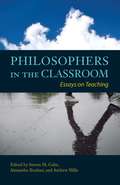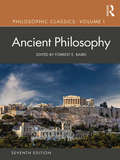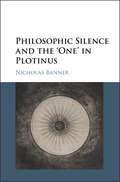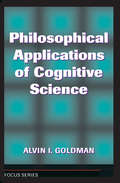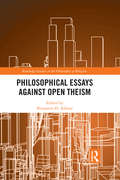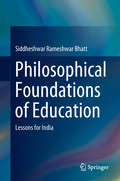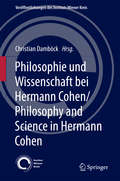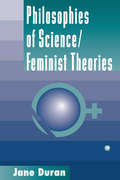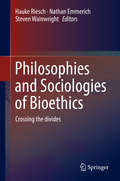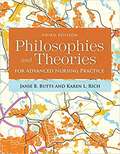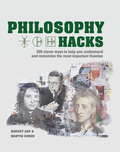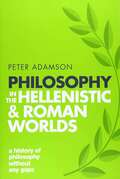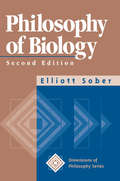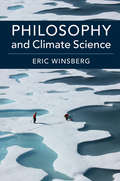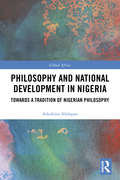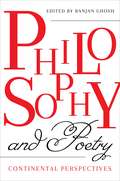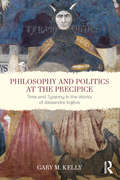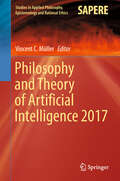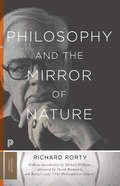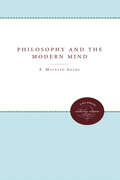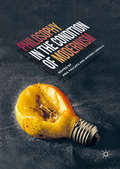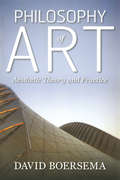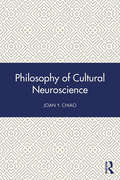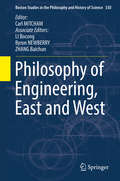- Table View
- List View
Philosophers in the Classroom: Essays on Teaching
by Steven M. Cahn Alexandra Bradner Andrew P. MillsIn these essays, 24 of our most celebrated professors of philosophy address the problem of how to teach philosophy today: how to make philosophy interesting and relevant; how to bring classic texts to life; how to serve all students; and how to align philosophy with more "practical" pursuits. Selected and introduced by three leaders in the world of philosophical education, the insights contained in this inspiring collection illuminate the challenges and possibilities of teaching the academy’s oldest discipline.
Philosophic Classics: Ancient Philosophy (Philosophic Classics)
by Forrest BairdThe third edition of a undergraduate text which collects writings of important philosophical figures dating from the late 1500s to the late 1700s. Presented are excerpts from prominent works by Francis Bacon, RenT Descartes, Thomas Hobbes, Blaise Pascal, Baruch Spinoza, John Locke, Gottfried Leibniz
Philosophic Silence and the ‘One’ in Plotinus
by Nicholas BannerPlotinus, the greatest philosopher of Late Antiquity, discusses at length a first principle of reality - the One - which, he tells us, cannot be expressed in words or grasped in thought. How and why, then, does Plotinus write about it at all? <P><P>This book explores this act of writing the unwritable. Seeking to explain what seems to be an insoluble paradox in the very practice of late Platonist writing, it examines not only the philosophical concerns involved, but the cultural and rhetorical aspects of the question. <P>The discussion outlines an ancient practice of ‛philosophical silence' which determined the themes and tropes of public secrecy appropriate to Late Platonist philosophy. Through philosophic silence, public secrecy and silence flow into one another, and the unsaid space of the text becomes an initiatory secret. Understanding this mode of discourse allows us to resolve many apparent contradictions in Plotinus' thought.<P>Approaches the use of themes of silence and secrecy in Plotinus in a way which accounts for their social and rhetorical, as well as their philosophical, significance.<P> Utilises methodologies from a number of fields, including classics, history of religions, and philosophy.<P> Constructs a model of a mode of discourse - philosophic silence - which determined in part the ways in which Platonist philosophers were expected to engage in public secrecy.
Philosophical Applications Of Cognitive Science
by Alvin I. GoldmanOne of the most fruitful interdisciplinary boundaries in contemporary scholarship is that between philosophy and cognitive science. Now that solid empirical results about the activities of the human mind are available, it is no longer necessary for philosophers to practice armchair psychology.In this short, accessible, and entertaining book, Alvin Goldman presents a masterly survey of recent work in cognitive science that has particular relevance to philosophy. Besides providing a valuable review of the most suggestive work in cognitive and social psychology, Goldman demonstrates conclusively that the best work in philosophy in a surprising number of different fields,including philosophy of science, epistemology, metaphysics, and ethics as well as philosophy of mind,must take into account empirical breakthroughs in psychology.One of those rare texts that will also be useful for professionals, Philosophical Applications of Cognitive Science is appropriate for students in a wide range of philosophy courses. It will also interest researchers and students in psychology who are intrigued by the wider theoretical implications of their work.
Philosophical Essays Against Open Theism (Routledge Studies in the Philosophy of Religion)
by Benjamin H. ArbourThis new collection of philosophically rigorous essays critiques the interpretation of divine omniscience known as open theism, focusing primarily on philosophically motivated open theism and positing arguments that reject divine knowledge of future contingents in the face of the dilemma of freedom and foreknowledge. The sixteen new essays in this collection, written by some of the most renowned philosophers on the topic of divine providence, represent a philosophical attempt to seriously consider open theism. They cover a wide variety of issues, including: the ontology of time, systematic metaphysics, perfect being theology, the Christian doctrine of the Incarnation, the problem of evil, and the nature of divine knowledge in general. Philosophical Essays Against Open Theism advances the discussion by wrestling against the assertions of open theism, and will be of interest to both proponents and opponents of this controversial issue.
Philosophical Foundations of Education: Lessons for India
by Siddheshwar Rameshwar BhattThis book provides a philosophical foundation to the theory and practice of education from the Indian perspective. It is guided by an 'axionoetic' approach to education and therefore it deals with the epistemological foundation and value orientation of education. The author discusses the ontological, epistemological, logical, ethical and axiological bases of education in a holistic and integrated manner. The author maintains that education is a planned, methodical and purposive enhancement of human potentialities as a natural development. This presupposes correct and adequate formulation of the objectives and goals of education as per the needs and aspirations of pupils. Education also equips individuals for a good quality of life. Keeping in view the applied dimension of philosophy, this book analyses practical issues of moral education like character building value-negativism in the context of education. It also deals with issues concerning peace, sustainable development, sustainable judicious consumption etc. which should have a bearing on educational policies and programmes.
Philosophie und Wissenschaft bei Hermann Cohen/Philosophy and Science in Hermann Cohen (Veröffentlichungen des Instituts Wiener Kreis #28)
by Christian DamböckDer Band versammelt einen Großteil der Beiträge, die internationale Experten anlässlich der Tagung „Philosophie und Wissenschaft bei Hermann Cohen“ im November 2014 am Institut Wiener Kreis der Universität Wien präsentiert haben. Mit der Tagung zu Hermann Cohen (1842 – 1918), der zusammen mit Paul Natorp die Marburger Schule begründete, wurden zwei Ziele verfolgt: erstens die Aspekte in der Philosophie des Kantianers Cohen herauszuarbeiten, die an die Idee einer Einheitswissenschaft anknüpfen und zweitens Divergenzen und Übereinstimmungen Cohens mit der wissenschaftlichen Weltauffassung, der Programmatik des Wiener Kreises um Rudolf Carnap und Moritz Schlick zu identifizieren. Der Tagungsband ist in drei Teile gegliedert. Die Aufsätze im ersten Teil beschäftigen sich mit der Bedeutung von Erfahrung und Empirismus für das Philosophieverständnis Hermann Cohens. Im zweiten Teil gehen die Autoren der Frage nach, welche Rolle Theorien aus den Bereichen Mathematik, Naturwissenschaften und Psychologie für Cohens Denken gespielt haben – unter anderem Hermann von Helmholtz‘ Theorie des Messens und die Bedeutung der Infinitesimalrechnung für die Philosophie der Marburger Schule. Die Beiträge im dritten Teil des Bandes stellen die Philosophie Cohens und der Marburger Schule den Vertretern des Wiener Kreises und der Berliner Gruppe um Hans Reichenbach gegenüber. Dabei wird Reichenbachs Rezeption der Relativitätstheorie in den Kontext einer Relativierung Kants bei Cohen und Ernst Cassirer gestellt und „versteckte Verwandtschaften“ zwischen Cohen und dem Logischen Empirismus aufgedeckt. Der Band richtet sich an Wissenschaftler auf dem Gebiet der Geschichte der Philosophie.
Philosophies Of Science: Feminist Theories
by Jane DuranThis book presents the current feminist critique of science and the philosophy of science in such a way that students of the philosophy of science, philosophers, feminist theorists, and scientists will find the material accessible and intellectually rigorous. }This book presents the current feminist critique of science and the philosophy of science in such a way that students of philosophy of science, philosophers, feminist theorists, and scientists will find the material accessible and intellectually rigorous.Contemporary feminist debate, as well as the debate brought on by the radical critics of science, assumesincorrectlythat certain movements in philosophy of science and science-driven theory are understood in their dynamics as well as in their details. All too often, labels such as Kuhnian or positivistic are taken for granted, and much of the contemporary postmodern or post-structuralist feminist theory that sets out to criticize science does little to alleviate the readers lack of knowledge with regard to such movements. Unlike other texts, Philosophies of Science: Feminist Theories provides a student-oriented framework so that, for example, positivism is given a thorough grounding before the feminist critique of such epistemological theory is given. Other movements discussed include the Kuhnian turn, sociology of science, and the radical critique of science. Feminist theory and critique are interwoven throughout, with one chapter devoted to feminist thought, which includes the work of such thinkers as Longino, Hararway, Hubbard, Nelson, Harding, and Keller. }
Philosophies and Sociologies of Bioethics: Crossing the divides
by Nathan Emmerich Hauke Riesch Steven WainwrightThis book is an interdisciplinary contribution to bioethics, bringing together philosophers, sociologists and Science and Technology Studies researchers as a way of bridging the disciplinary divides that have opened up in the study of bioethics. Each discipline approaches the topic through its own lens providing either normative statements or empirical studies, and the distance between the disciplines is heightened not only by differences in approach, but also disagreements over the values, interpretations and problematics within bioethical research. In order to converse across these divides, this volume includes contributions from several disciplines. The volume examines the sociological issues faced by interdisciplinary research in bioethics, the role of expertise, moral generalisations, distributed agency, and the importance of examining what is not being talked about. Other contributions try to take an interdisciplinary look at a range of specific situations, fetal alcohol syndrome in the media, citizen science, electronic cigarettes and bioethical issues in human geography.
Philosophies and Theories for Advanced Nursing Practice
by Janie B. Butts Karen L. RichPhilosophies and Theories for Advanced Nursing Practice, Third Edition is an essential resource for advanced practice nursing students in master's and doctoral programs. This text is appropriate for students needing an introductory understanding of philosophy and how a theory is constructed as well as students and nurses who understand theory at an advanced level. The Third Edition features expanded discussion of the AACN DNP essentials which is critical for DNP students as well as PhD students who need a better understanding of the DNP educated nurse's role. <p><p> Philosophies and Theories for Advanced Nursing Practice, Third Edition covers a wide variety of theories in addition to nursing theories. Coverage of non nursing related theory is beneficial to nurses because of the growing national emphasis on collaborative, interdisciplinary patient care.
Philosophy Hacks (Hacks Ser.)
by Robert Arp Martin CohenDiscover the simple way to understand and remember the most groundbreaking concepts in 3,000 years of philosophical thought. Each idea is broken down into three stages: 1/ The helicopter view, which gives you an introduction to the idea, and some context around it. 2/ The shortcut, which gives you the core elements of the theory, along with a range of examples that everyone can understand. 3/ The hack, which is a one-liner designed to stick in your memory and give you an instant grasp of the concept.From Pascal's Wager to Kant's categorical imperative, and from Camus's Existential Nihilism to Arendt's Banality of Evil, there are 100 concepts explained. The perfect introduction to philosophy, this is a great new way to learn about the most important philosophical ideas and concepts in a way that makes them easy to recall even months after reading the book.
Philosophy Hacks (Hacks)
by Robert Arp Martin CohenDiscover the simple way to understand and remember the most groundbreaking concepts in 3,000 years of philosophical thought. Each idea is broken down into three stages: 1/ The helicopter view, which gives you an introduction to the idea, and some context around it. 2/ The shortcut, which gives you the core elements of the theory, along with a range of examples that everyone can understand. 3/ The hack, which is a one-liner designed to stick in your memory and give you an instant grasp of the concept.From Pascal's Wager to Kant's categorical imperative, and from Camus's Existential Nihilism to Arendt's Banality of Evil, there are 100 concepts explained. The perfect introduction to philosophy, this is a great new way to learn about the most important philosophical ideas and concepts in a way that makes them easy to recall even months after reading the book.
Philosophy In The Hellenistic And Roman Worlds: A History Of Philosophy Without Any Gaps, Volume 2
by Peter AdamsonPeter Adamson offers an accessible, humorous tour through a period of eight hundred years when some of the most influential of all schools of thought were formed: from the third century BC to the sixth century AD. He introduces us to Cynics and Skeptics, Epicureans and Stoics, emperors and slaves, and traces the development of Christian and Jewish philosophy and of ancient science. Chapters are devoted to such major figures as Epicurus, Lucretius, Cicero, Seneca, Plotinus, and Augustine. But in keeping with the motto of the series, the story is told ''without any gaps,'' providing an in-depth look at less familiar topics that remains suitable for the general reader. For instance, there are chapters on the fascinating but relatively obscure Cyrenaic philosophical school, on pagan philosophical figures like Porphyry and Iamblichus, and extensive coverage of the Greek and Latin Christian Fathers who are at best peripheral in most surveys of ancient philosophy. A major theme of the book is in fact the competition between pagan and Christian philosophy in this period, and the Jewish tradition also appears in the shape of Philo of Alexandria. Ancient science is also considered, with chapters on ancient medicine and the interaction between philosophy and astronomy. Considerable attention is paid also to the wider historical context, for instance by looking at the ascetic movement in Christianity and how it drew on ideas from Hellenic philosophy. From the counter-cultural witticisms of Diogenes the Cynic to the subtle skepticism of Sextus Empiricus, from the irreverent atheism of the Epicureans to the ambitious metaphysical speculation of Neoplatonism, from the ethical teachings of Marcus Aurelius to the political philosophy of Augustine, the book gathers together all aspects of later ancient thought in an accessible and entertaining way.
Philosophy Of Biology: Essays In Evolutionary Philosophy (Dimensions Of Philosophy Ser.)
by Elliott SoberPerhaps because of it implications for our understanding of human nature, recent philosophy of biology has seen what might be the most dramatic work in the philosophies of the ?special? sciences. This drama has centered on evolutionary theory, and in the second edition of this textbook, Elliott Sober introduces the reader to the most important issues of these developments. With a rare combination of technical sophistication and clarity of expression, Sober engages both the higher level of theory and the direct implications for such controversial issues as creationism, teleology, nature versus nurture, and sociobiology. Above all, the reader will gain from this book a firm grasp of the structure of evolutionary theory, the evidence for it, and the scope of its explanatory significance.
Philosophy and Climate Science
by Eric WinsbergThere continues to be a vigorous public debate in our society about the status of climate science. Much of the skepticism voiced in this debate suffers from a lack of understanding of how the science works - in particular the complex interdisciplinary scientific modeling activities such as those which are at the heart of climate science. <P><P>In this book Eric Winsberg shows clearly and accessibly how philosophy of science can contribute to our understanding of climate science, and how it can also shape climate policy debates and provide a starting point for research.<P>Covering a wide range of topics including the nature of scientific data, modeling, and simulation, his book provides a detailed guide for those willing to look beyond ideological proclamations, and enriches our understanding of how climate science relates to important concepts such as chaos, unpredictability, and the extent of what we know.<P> Provides a comprehensive and accessible introduction to the philosophy of climate science.<P> Advances our understanding of how philosophy can contribute to debates in climate science.<P> Offers useful case studies and suggestions for further reading.
Philosophy and National Development in Nigeria: Towards a Tradition of Nigerian Philosophy (Global Africa)
by Adeshina AfolayanWhat does it imply for Nigerian philosophers to conscientiously and engagingly reflect on Nigeria as a place of philosophy and as a dynamic plural context of socioeconomic, political, cultural and ethnic problems? Any answer to this question automatically constitutes the opening salvo to the reflection on the evolution of a Nigerian tradition of philosophy and philosophizing. This book represents such an initial salvo in in its attempt to hammer out the conditions for the possibility of a Nigerian tradition of philosophy by placing that endeavor in between the triadic challenges of the Nigerian political economy, the African philosophical theorizing and the global epistemological hegemony. How do these three dynamics condition the evolution and functional relevance of the philosophical enterprise in Nigeria? How have Nigerian philosophers responded to them? What is Nigerian philosophy? How can there be a "Nigerian" philosophy when there are no Nigerians? This book is also an attempt to contribute to the trajectory of philosophy education in Nigeria within the context of a postcolonial educational system and university dynamics that stultifies the role of the intellectuals in development. From Plato to Wiredu, from Bodunrin to Bourdieu, and from Heidegger and Nietzsche to Fanon, Mignolo and Santos, the book traces a trajectory of dynamics rethinking of existing paradigms and epistemological assumptions that could enable a robust evolution of a Nigerian tradition of philosophy that possesses sufficient clout to confront its historicity and its place in Nigeria’s development impasse.
Philosophy and Poetry: Continental Perspectives
by Ranjan GhoshEver since Plato’s Socrates exiled the poets from the ideal city in The Republic, Western thought has insisted on a strict demarcation between philosophy and poetry. Yet might their long-standing quarrel hide deeper affinities? This book explores the distinctive ways in which twentieth-century and contemporary continental thinkers have engaged with poetry and its contribution to philosophical meaning making, challenging us to rethink how philosophy has been changed through its encounters with poetry.In wide-ranging reflections on thinkers such as Heidegger, Gadamer, Arendt, Lacan, Merleau-Ponty, Deleuze, Irigaray, Badiou, Kristeva, and Agamben, among others, distinguished contributors consider how different philosophers encountered the force and intensity of poetry and the negotiations that took place as they sought resolutions of the quarrel. Instead of a clash between competing worldviews, they figured the relationship between philosophy and poetry as one of productive mutuality, leading toward new modes of thinking and understanding. Spanning a range of issues with nuance and rigor, this compelling and comprehensive book opens new possibilities for philosophical poetry and the poetics of philosophy.
Philosophy and Politics at the Precipice: Time and Tyranny in the Works of Alexandre Kojève
by Gary M. KellyPhilosophy and Politics at the Precipice maintains that political philosopher Alexandre Kojève (1901–68) has been both famously misunderstood and famous for being misunderstood. Kojève was famously understood by interpreters for seeing an "end of history" (an end that would display universal free democracies and even freer markets) as critical to his thought. He became famously misunderstood when interpreters, at the end of the twentieth century, placed such an end at the center of his thought. This book reads Kojève again – as a thinker of time, not its end. It presents Kojève as a philosopher and precisely as a time phenomenologist, rather than as a New Age guru. The book shows how Kojève’s time is inherently political, and indeed tyrannical, for being about his understanding of human relation. However, Kojève’s views on time and tyranny prove his undoing for making rule impossible because of what the book terms the "time-tyrant problem." Kojève’s entire political corpus is best understood as an attempt to rectify this problem. So understood, Philosophy and Politics at the Precipice provides fresh perspective on the true nature of Kojèvian irony, Kojève’s aims in the Strauss–Kojève exchange, and how Kojève at his best captures a philosophical, phenomenological time, one that marks some of the most dynamic and unique events of the twentieth century. Headlines have largely erased the notion that history has ended. Philosophy and Politics at the Precipice, on the other hand, provides the philosophical justification for arguing that the end of the last millennium was not an end and that, for his view of time, Kojève remains a thinker for the times ahead.
Philosophy and Theory of Artificial Intelligence 2017 (Studies in Applied Philosophy, Epistemology and Rational Ethics #44)
by Vincent C. MüllerThis book reports on the results of the third edition of the premier conference in the field of philosophy of artificial intelligence, PT-AI 2017, held on November 4 - 5, 2017 at the University of Leeds, UK. It covers: advanced knowledge on key AI concepts, including complexity, computation, creativity, embodiment, representation and superintelligence; cutting-edge ethical issues, such as the AI impact on human dignity and society, responsibilities and rights of machines, as well as AI threats to humanity and AI safety; and cutting-edge developments in techniques to achieve AI, including machine learning, neural networks, dynamical systems. The book also discusses important applications of AI, including big data analytics, expert systems, cognitive architectures, and robotics. It offers a timely, yet very comprehensive snapshot of what is going on in the field of AI, especially at the interfaces between philosophy, cognitive science, ethics and computing.
Philosophy and the Mirror of Nature
by Michael Williams David Bromwich Richard RortyWhen it first appeared in 1979, Philosophy and the Mirror of Nature hit the philosophical world like a bombshell. In it, Richard Rorty argued that, beginning in the seventeenth century, philosophers developed an unhealthy obsession with the notion of representation: comparing the mind to a mirror that reflects reality. Rorty's book is a powerful critique of this imagery and the tradition of thought that it spawned. Today, the book remains a must-read and stands as a classic of twentieth-century philosophy. Its influence on the academy, both within philosophy and across a wide array of disciplines, continues unabated. This edition includes new essays by philosopher Michael Williams and literary scholar David Bromwich, as well as Rorty's previously unpublished essay "The Philosopher as Expert."
Philosophy and the Modern Mind
by E. Maynard AdamsIn this unique philosophical critique of modern Western civilization, Adams argues that contemporary culture is deranged by false assumptions about the human mind. He sees a growing gap between the subjectivistic culture and the structure of reality which has not only produced Originally published 1975.A UNC Press Enduring Edition -- UNC Press Enduring Editions use the latest in digital technology to make available again books from our distinguished backlist that were previously out of print. These editions are published unaltered from the original, and are presented in affordable paperback formats, bringing readers both historical and cultural value.
Philosophy in the Condition of Modernism
by Ana Falcato Antonio CardielloProduced on the fringes of philosophy and literary criticism, this book is a pioneering study which aims to explicitly address and thematize what may be called a “critical philosophy in the condition of modernism”. Its most important and original contribution to both disciplines is a self-conscious reflection on possible modes of writing philosophy today, and a systematic comparison with what happened in literary modernism at the beginning of the twentieth-century. The volume is divided into six sections, where internationally renowned scholars discuss such pressing topics as the role of an unreliable narrator in a major philosophical treatise, the different mediums of art-production and how these impact on our perception of the Work itself, the role of narrative in animal ethics and the filmic adaption of a Modernist classic.
Philosophy of Art: Aesthetic Theory and Practice
by David BoersemaWith the sustained, coherent perspective of an authored text and the diverse, authoritative views typical of an anthology,Philosophy of Art: Aesthetic Theory and Practice by David Boersema provides the context and commentary students need to comprehend the various issues in philosophy of art. Throughout the book, issues are examined using the lenses of the three broad areas of philosophy: metaphysics, epistemology, and value theory. That is, concerns are raised about what is expressed, how it is expressed, and why it is expressed. Chapters on the artist, the audience, and the artwork further break down the discipline and are applied to the final chapters on the specific types of art. The differences between art and science as well as the relationship of art and society provide a refreshing discussion of overlooked areas in philosophy of art.
Philosophy of Cultural Neuroscience
by Joan Y. ChiaoThe goal of this volume is to highlight theoretical and methodological advances in cultural neuroscience and the implications of theoretical and empirical advances in cultural neuroscience for philosophy. The study of cultural and biological factors that contribute to human behavior has been an important inquiry for centuries, and recent advances in the field of cultural neuroscience allow for novel insights into how cultural and biological factors shape mind, brain and behavior. Theoretical and empirical advances in cultural neuroscience, which investigate the origins of culture, may shed light on philosophical issues of the mind and science.
Philosophy of Engineering, East and West
by Carl Mitcham Bocong Li Byron Newberry Baichun ZhangThis co-edited volume compares Chinese and Western experiences of engineering, technology, and development. In doing so, it builds a bridge between the East and West and advances a dialogue in the philosophy of engineering. Divided into three parts, the book starts with studies on epistemological and ontological issues, with a special focus on engineering design, creativity, management, feasibility, and sustainability. Part II considers relationships between the history and philosophy of engineering, and includes a general argument for the necessity of dialogue between history and philosophy. It continues with a general introduction to traditional Chinese attitudes toward engineering and technology, and philosophical case studies of the Chinese steel industry, railroads, and cybernetics in the Soviet Union. Part III focuses on engineering, ethics, and society, with chapters on engineering education and practice in China and the West. The book’s analyses of the interactions of science, engineering, ethics, politics, and policy in different societal contexts are of special interest. The volume as a whole marks a new stage in the emergence of the philosophy of engineering as a new regionalization of philosophy. This carefully edited interdisciplinary volume grew out of an international conference on the philosophy of engineering hosted by the University of the Chinese Academy of Sciences in Beijing. It includes 30 contributions by leading philosophers, social scientists, and engineers from Australia, China, Europe, and the United States.
